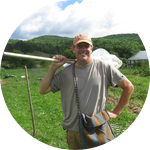Please wait...
About This Project
Veganic farmers grow crops organically and without farmed animal products such as manure and blood, feather, and fish meals. Veganic farming offers a range of potential environmental and human health benefits while aligning with vegan values. We will conduct interviews with veganic farmers across the United States to better understand farmer motivations and experiences; farmer-identified best practices; and farmer needs, including resources essential to growing the veganic agriculture movement.

Browse Other Projects on Experiment
Related Projects
A sociotechnical toolkit for coral conservation and regeneration
This project aims to develop a sociotechnical toolkit for deploying meaningful biotechnologies in coral...
How does indigenous storytelling communicate best practices for coral reef management on Ulithi Atoll
Coral reef ecosystems are in need of conservation solutions. Indigenous adaptive management, supported by...
How do Black women fishing communities in Ecuador and Madagascar manage mangrove habitats and mitigate climate change?
I'm studying the resilient ways of ILK (indigenous and local knowledge) eco-governance of mangrove habitats...



